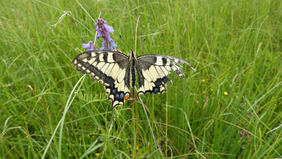Together with our partners, within GOBIOM our aim is to examine the promotion of biodiversity and milk production and how their combination can be made economically viable, with a focus on the “Biomusterregionen” of Ravensburg and Freiburg [both links in German] in Baden-Württemberg. The first project newsletter was published in July, among other things, presenting results on the clear differences in the agricultural structures of the two regions.
Ravensburg is known as a forage-growing region and a region of milk production, which is also reflected in a high proportion of meadows and pastures; furthermore, plants for green harvesting are cultivated on about half of the arable land. In addition, 90% of all full-time farms with cattle in the region keep dairy cows and half of all farms can be declared as specialised dairy farms. In comparison, fodder farming and milk production are a much less prominent part of agriculture in the Freiburg region. Here, arable farming and the cultivation of permanent crops are of greater importance, but the available grassland is managed to an above-average extent as pasture or extensive permanent grassland. About half of the full-time farms with livestock have dairy cows; these farms make up only 6% of all farms in the region, but are responsible for two-thirds of the dairy cows.
In addition to the structural analyses, the first farms in the Ravensburg region have now received advisory services from our partner Tobias Pape (grünweg) [link in German]. Their commitment to biodiversity became clear, be it in the management and maintenance of valuable areas in a nature reserve or the leaving of buffer strips along ditches.
Further information on the project can be found on the project page, likewise you may register to the project newsletter.
Contact persons at IfLS: Dr. Holger Pabst (pabst@ifls.de) and Jörg Schramek (schramek@ifls.de)
